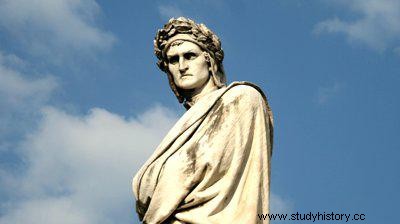Dante Alighieri In addition to being the greatest Italian poet, he was a man of action, committed to his city, Florence, which he loved above all things and which he ended up losing forever. Fate has wanted that he, not even after death, has he been able to return to the shelter of his homeland.
At the beginning of the 13th century, the Italian peninsula was abuzz with the struggle for hegemony between papacy and empire. Dante, who held important political positions in Florence, leaned towards the “Guelph faction. ”, closer to pontifical interests, compared to the “Ghibellines ” who supported the emperor. The expansionist desires of Pope Boniface VIII, a despot alien to the traditions of autonomy of Italian cities, ended up splitting his own party, throwing many into exile.

Dante Alighieri was one of them. Expelled in 1302, he was sentenced to death in absentia. He toured all of Italy, supporting any initiative that would allow him to return to his homeland and when he definitively lost that hope, he went on pilgrimage to the courts that offered him hospitality, checking “ how bitter the bread that is received from others tastes ”. His last resting place was Ravenna, under the protection of Guido Novello da Polenta , friend and admirer of his work, whom he served on diplomatic missions until his death in 1321. Dante was buried, with the honors denied in his city, in the Church of San Francisco, in the care of the Hermanos Menores . Not even so did his enemies cease to persecute him. His work “ De Monarchia ”, support of the imperials, maintained that the imperial authority was independent of the successor of Pedro. He felt so bad that Cardinal Bertrando di Poggetto he lit a bonfire in Bologna, just eight years after Dante's death, in which he threw the book and, not content with that symbolic act, tried to obtain similar revenge for the remains of the poet. Fortunately, he did not succeed and with the passing of time a new Florentine pride arose that repeatedly tried to claim the remains of the poet. Ravenna, jealous of his treasures -and this one was perhaps the most precious-, always responded with a phrase that hurt the ears of the Florentines like brambles:" You did not know how to keep him alive, we will not give him to you dead ”.
They were about to achieve it at the beginning of the 16th century when a group of Florentine citizens, led by the sculptor Michelangelo, requested this favor from Pope Leo X. The powerful Médici , whom even the bravest refused to face, he was defeated by the humblest, the Brothers of Francisco , who hid the remains inside a hole dug in the wall. When the papal commission opened the tomb, it was empty and there was nothing to transport the sumptuous monument that awaited in Florence. Except for three bones in a foot that the friars must have forgotten. The astute Raven authorities assured that, undoubtedly, Dante Alighieri, due to his many merits, had been authorized by God himself to reincarnate early . Neither did that explain why he had left three bones in his foot, nor, of course, did Leo X buy the story, although no one disputed the veracity of a theory that the Church itself advocated.
It took more than a century, until 1677, for the skeleton to be discovered in a wooden box with the inscription, “Dantes ossa during some work on the convent. ”. Later, the wandering spirit of the poet must have intervened again, because the box was once again hidden due to the fear of being pushed by the Napoleonic troops. On May 27, 1864, the box reappeared. Dante Alighieri continues to rest in Ravenna and Florence continues to claim the remains of the poet, regretting that they did not know how to keep alive what they did not know how to keep dead.
see DANTE'S CIRCLES in myLIBRETO
“A perfect novel to learn history or get to know the political facet of Dante through an enjoyable and truly engaging read ”
